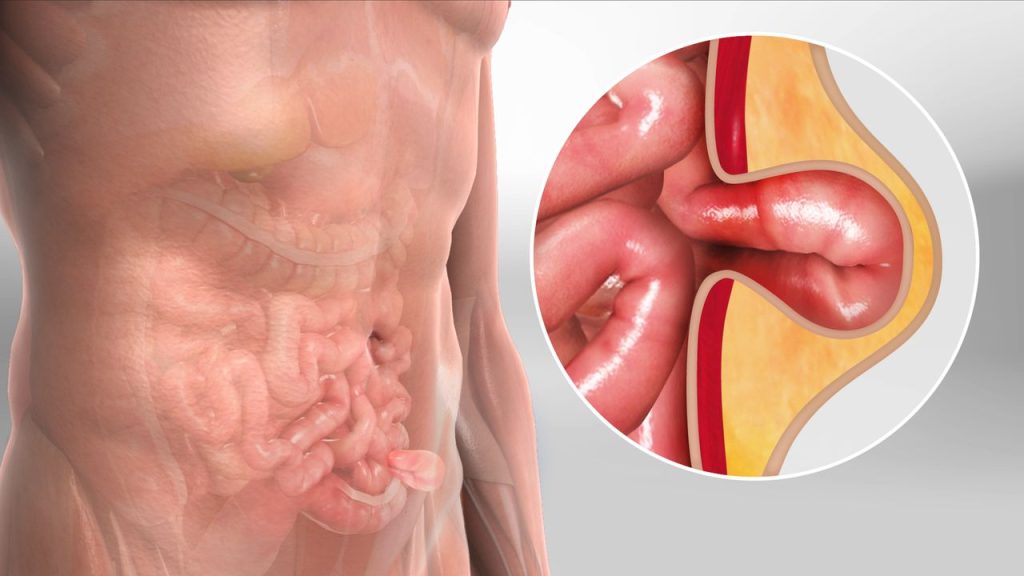Incisional hernias
Incisional hernia occurs between 15-20% of people who have undergone surgeries that include making a surgical incision in the abdominal area, and there are some factors that may increase or reduce the risk of an incisional hernia.

What are the symptoms of incisional hernia?
One of the most obvious symptoms of an incisional hernia is a bulge near the incision site. It is often more noticeable when muscles are strained, such as standing, lifting something, or coughing.
Also, incisional hernia causes:
- Vomiting and nausea
- Fever
- Burning or soreness near the hernia
- Abdominal pain and discomfort, especially around the hernia area
- The heartbeat is faster than normal
- holding
- Diarrhea
It is expected that the hernia will occur after surgery (between three and six months) but it can also occur before or after the above period of time.
Reversible and irreversible incisional hernias
There are two types of retractable and non-reducible hernias, and the difference between them lies in the possibility of retracting the hernia inside or not, in the retractable type it is possible to return it to the inside and it may shrink after a period of staying in the supine position, and in the case of the irreversible hernia it is difficult to push the hernia Inward because part of the intestine pushes into the hernia, and an irreversible hernia can lead to bowel obstruction which can then lead to a strangulated hernia requiring immediate treatment.
It is recommended to consult a doctor immediately if any swelling is observed, the color turns dark red or purple, or when severe pain is felt.
Causes of incisional hernia:
Incisional hernias occur after surgery when a wound in the abdominal wall does not close properly and this can cause the abdominal muscles to weaken, allowing tissues and organs to form a hernia.
Several things can prevent a wound from healing properly, including:
- Pressing hard on the abdomen
- Pregnancy before the wound has completely healed
- Return to physical activities soon after surgery
Interestingly, in some cases, there is no obvious reason for the wound not healing properly.
Are there risk factors for an incisional hernia?
There are several factors that may increase the risk of an incisional hernia, including:
- wound infection
- Health conditions such as kidney failure, diabetes or lung disease
- Obesity
- smoking
- Certain medications, including immunosuppressants or steroids
The risk of developing a hernia can be reduced by meeting the recommended recovery time after abdominal surgery.
How is an incisional hernia treated?
It should be noted that the hernia does not go away on its own and can only be treated with surgery. The method of dealing varies according to the type of hernia.
Dealing with small or reversible hernias:
It is possible for the patient to delay surgery if the hernia is small or reversible. When treating, the doctor takes into account the patient’s medical history and other factors when determining whether or not surgery will repair the hernia.
Surgery can be abandoned if the hernia causes little or no discomfort, in which case the doctor may recommend a special belt that helps maintain pressure over the hernia to prevent it from protruding.
Large or irreversible incisional hernias
The patient needs surgery if the hernia grows and becomes irreversible. In general, the option depends on the symptoms, the size of the hernia, and the patient’s medical history.
Open hernia repair
Open hernia repair involves making an incision at the site of the hernia. The surgeon moves the tissues, intestines, and other organs that make up the hernia into the abdomen and closes the opening.
He or she may also use a mesh patch to strengthen the place where the hernia has developed. The retinal grafts are sutured to the tissue surrounding the hernia
Laparoscopic repair

Laparoscopic hernia repair involves making several small incisions instead of one large incision. Hollow tubes are placed, and air is inflated in the abdomen to make the organs more visible. The surgeon then inserts surgical instruments, including a small camera, into the tubes. A stent may also be used. Laparoscopic surgery is less invasive, and the patient is likely to leave the hospital in a short time.
What are the complications of incisional hernia?
The most serious complications of incisional hernias are bowel obstruction and strangulation. A strangulated hernia can cause tissue death in the intestine. And this condition may be life-threatening if the patient does not get immediate treatment and it is possible to rupture the hernia, but it is extremely rare.
Small hernias grow if not treated over time. And if the hernia becomes very large, it may cause swelling and pain in the abdomen and eventually become irreversible, as it is likely to cause a lot of inconvenience, and if the hernia of any size causes severe pain or discomfort or has a negative effect on the patient, it is best to review the doctor.

Incisional hernias in Türkiye
The medical staff of surgical teams, doctors and consultants in REHABTÜRK can offer the best treatment options and free consultations by striving to keep abreast of the latest medical technologies and methods.
